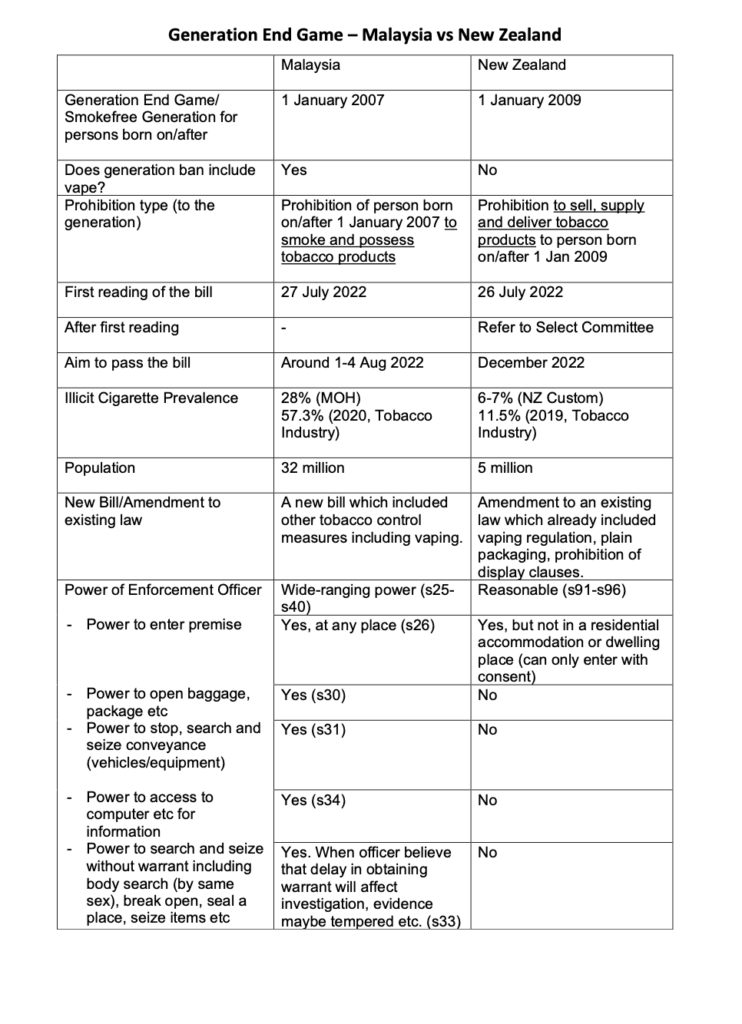On July 27, 2022, the Tobacco Product and Smoking Control Bill was tabled in Parliament for its first reading. This was the first time the MPs had read it. Since then, there have been many discussions on the pros and cons of the Bill.
The most discussed tobacco control measure in the Bill is what is touted as the Generation End Game (GEG), which seeks to prevent an entire generation from consuming all tobacco products.
In fact, the day before this Bill was tabled in Parliament, the Smokefree Environments and Regulated Products (Smoked Tobacco) Amendment Bill was tabled in the New Zealand Parliament, which included New Zealand’s version of GEG. This version is called Smokefree Generation. The following table shows the differences between the Malaysian and New Zealand versions of GEG.

With the prevalence of illicit cigarettes at 6 to 7 per cent, according to the New Zealand Customs Service (or 11.5 per cent, according to the tobacco industry), New Zealand aims to start their generation ban on smoked tobacco products (not including vaping) for those born on or after January 1, 2009.
On the other hand, the prevalence of illicit cigarettes in Malaysia is at 28 per cent, according to the Ministry of Health (MOH) (or 57.3 per cent, according to the tobacco industry). With weaker enforcement capability, Malaysia aims to start the generation ban on all tobacco products (including vaping) two years earlier, for those born on or after January 1, 2007.
Is this start date achievable? Should we include vaping in the generation ban?
New Zealand’s version of GEG prohibits the selling, supply, and delivery of tobacco products to people born on or after January 1, 2009, whereas Malaysia’s GEG includes the prohibition the selling, supply, and delivery of tobacco products to people born on or after January 1, 2007.
Which type of prohibition is more effective? Or is prohibition the right way to go?
In addition, the Tobacco Product and Smoking Control Bill is a new Bill, which also includes other tobacco control measures such as vape industry regulations, plain packaging, and prohibition of display.
What is the impact on society when this law comes into force? The public should note that there was no Regulatory Impact Assessment report available for MPs to consider.
In terms of enforcement, the Malaysian Tobacco Product and Smoking Control Bill confers wide-ranging powers to enforcement officers, while in New Zealand, enforcement officers only has the power to enter non-residential premises for investigation, and these enforcement actions would need a warrant.
Why do enforcement officers in Malaysia need such wide-ranging powers? Do these clauses infringe upon personal privacy and human rights?
I do not have definite answers to most of the questions above, and would like to listen to a diversity of views (other than the MOH’s view) from different parts of society. I believe that most MPs would like to do that, and some may have other questions regarding the Bill.
New Zealand MPs are given four months to consider amendments to an existing law, but Malaysian MPs are expected to decide in less than a week for an entirely new Bill. Is it right for Malaysia MPs to support a Bill without much deliberation in the name of good intention?
I hope that the Tobacco Product and Smoking Control Bill will be sent to the following Parliamentary Select Committees:
- Health, Science and Innovation.
- Women, Children and Social Development.
- Fundamental Liberties and Constitutional Rights.
This is to facilitate further deliberations with different stakeholders, which should prompt the MOH to do a more comprehensive regulatory impact assessment on the Bill. The reports from these committees and the MOH can then be tabled in Parliament, so that MPs can study the Bill in a more comprehensive manner.
Let us make a good law to achieve the good intention of reducing smoking prevalence in Malaysia.
Yeo Bee Yin is the Member of Parliament for Bakri.
- This is the personal opinion of the writer or publication and does not necessarily represent the views of CodeBlue.






